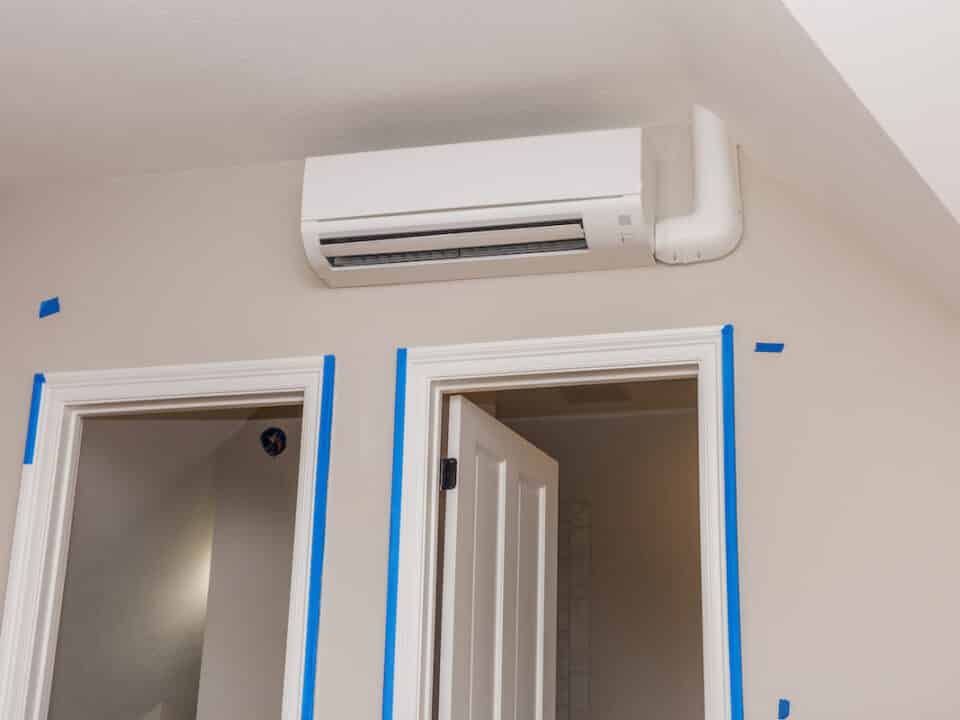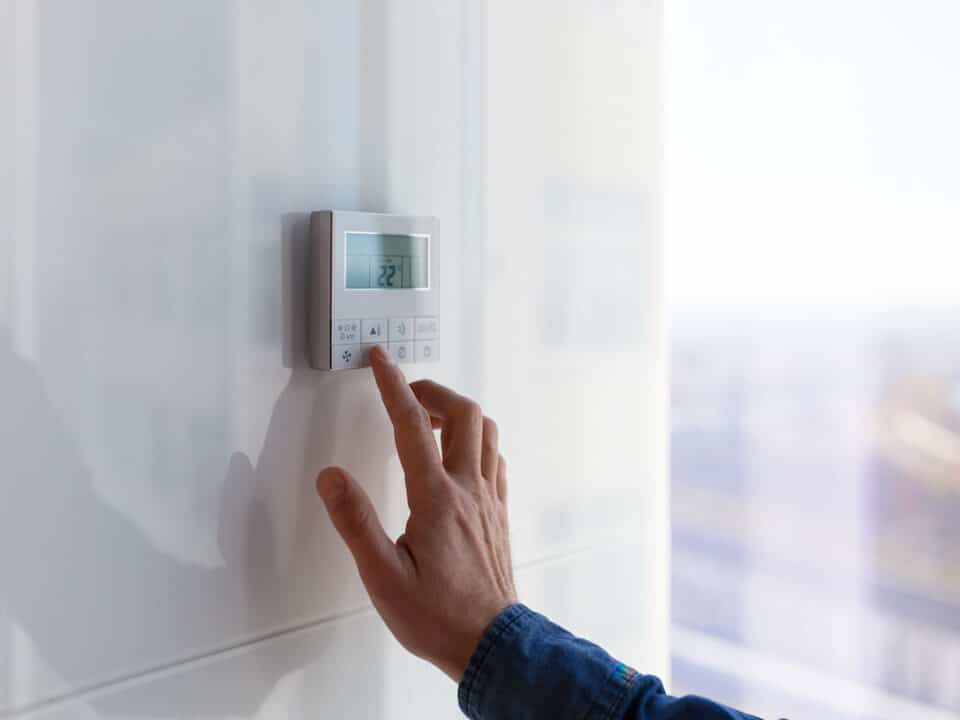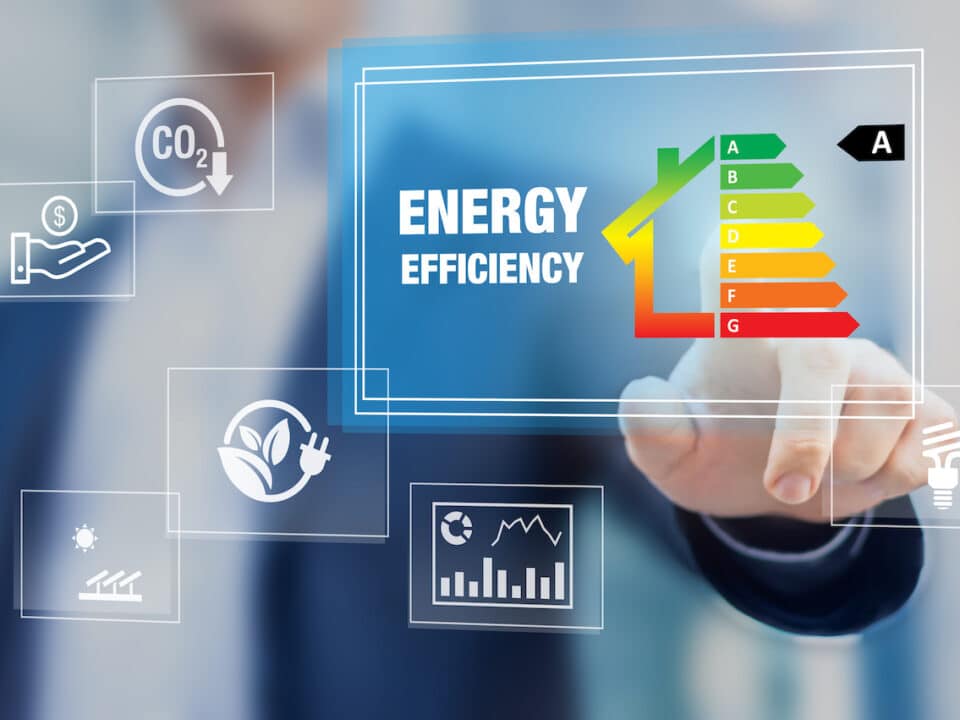Improving Your HVAC System’s Energy Efficiency
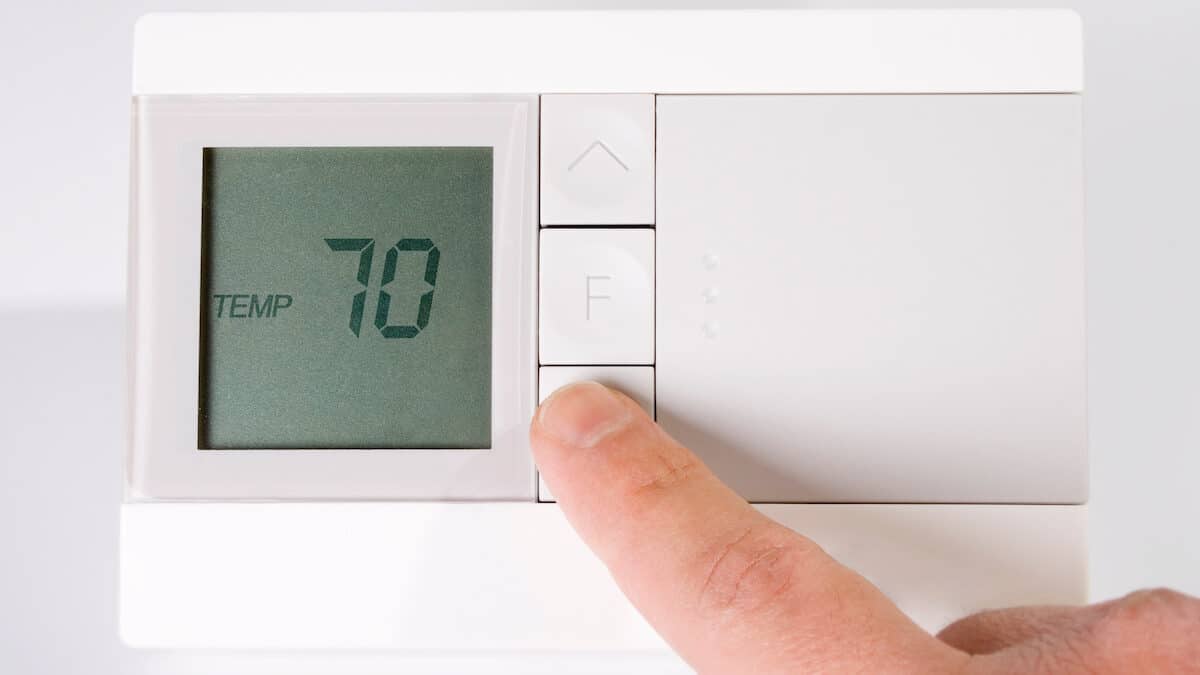
In the modern world, where energy conservation and sustainability are critical concerns, finding ways to improve the energy efficiency of your HVAC (Heating, Ventilation, and Air Conditioning) system is both environmentally responsible and economically beneficial.
A well-maintained and optimized HVAC system not only enhances indoor comfort but also helps reduce energy consumption and utility bills.
In this comprehensive guide, we’ll explore effective strategies to boost your HVAC system’s energy efficiency, allowing you to enjoy a comfortable home environment while minimizing your carbon footprint.
1. Regular Maintenance: The Foundation of Energy Efficiency
Professional Inspections
Scheduling routine professional inspections for your HVAC system is crucial. Certified technicians, like the team at Trust Heating and Air, can identify and address issues before they escalate, ensuring that your system operates at its peak efficiency. This includes:
- Checking for refrigerant levels
- Inspecting electrical components
- Cleaning coils
- Verifying proper airflow
Neglecting maintenance can lead to decreased efficiency, higher energy bills, and even system breakdowns. Regular inspections not only prevent issues but also extend the lifespan of your HVAC system. Continue reading for additional benefits of regular HVAC preventive maintenance.
Additional Benefits of Regular HVAC Preventative Maintenance
Regular professional preventative maintenance for your HVAC system offers a host of benefits that contribute to improved comfort, energy efficiency, and long-term cost savings. Here’s why investing in regular maintenance is a wise decision:
1. Enhanced System Efficiency
Regular maintenance ensures that your HVAC system operates at its peak efficiency. Dust, dirt, and debris can accumulate in components such as filters, coils, and fans, causing the system to work harder to achieve the desired temperatures. A well-maintained system performs optimally, consuming less energy and reducing utility bills.
2. Extended Lifespan
HVAC systems are a substantial investment, and proper maintenance can extend their lifespan significantly. During maintenance visits, technicians identify and address minor issues before they escalate into major problems that could lead to system failure. This proactive approach helps prevent premature breakdowns, reducing the need for costly repairs or early replacements.
3. Improved Indoor Air Quality
Regular maintenance includes cleaning and replacing air filters, which play a critical role in improving indoor air quality. Clean filters prevent dust, allergens, and contaminants from circulating throughout your home, creating a healthier living environment for you and your family.
4. Consistent Comfort
Maintained HVAC systems provide consistent and even heating and cooling throughout your home.
Properly functioning components ensure that every room receives the desired level of comfort, eliminating temperature fluctuations that can lead to discomfort.
5. Early Issue Detection
Trained HVAC technicians are skilled at identifying potential problems during maintenance visits. By catching issues early, they prevent more extensive damage and minimize the likelihood of sudden breakdowns.
This proactive approach saves you from the inconvenience of unexpected system failures, especially during extreme weather conditions.
6. Warranty Compliance
Many HVAC manufacturers require regular professional maintenance to uphold warranty terms. Neglecting maintenance can void warranty coverage, leaving you responsible for the full cost of repairs or replacements.
Now, back to tips for enhancing energy efficiency.
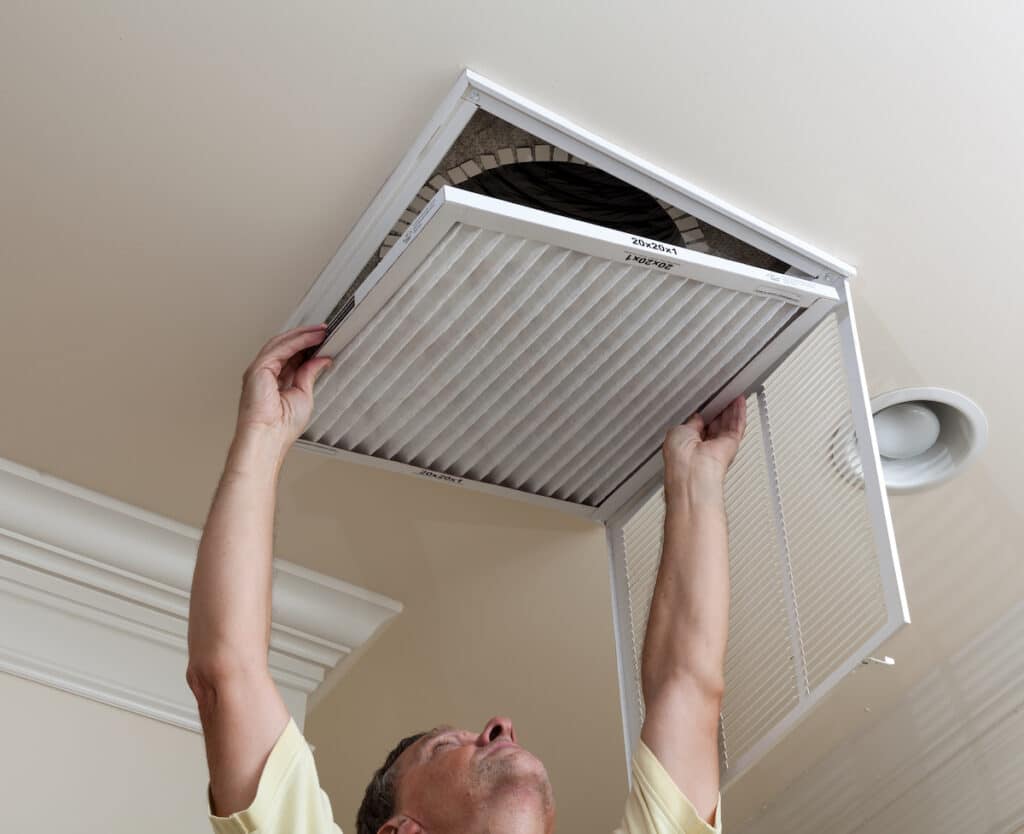
Air Filter Replacement
Regularly changing or cleaning your HVAC system’s air filters is a simple yet effective way to maintain efficiency. Clogged filters restrict airflow, forcing the system to work harder and consume more energy. Aim to replace or clean filters every 1 to 3 months, depending on usage and the type of filter.
Filters not only improve energy efficiency but also enhance indoor air quality by capturing dust, allergens, and particles that can affect your health.
2. Programmable Thermostats: Precision and Control
Setback and Scheduling
Installing a programmable thermostat grants you the power to optimize your HVAC system’s operation based on your daily schedule. Setbacks can be programmed to reduce heating or cooling when you’re away from home, ensuring that energy isn’t wasted on maintaining comfortable temperatures in an unoccupied space.
Programmable thermostats offer the convenience of adjusting temperatures automatically, which can lead to significant energy savings over time.
Zoning
If your home has multiple zones with different heating and cooling needs, consider a zoned HVAC system. Zoning allows you to independently control temperatures in various areas, preventing energy waste by only conditioning spaces that are in use.
Zoning systems not only save energy but also contribute to personalized comfort, as each zone can be set to the occupants’ preferences.
3. Seal Air Leaks: Preventing Energy Loss
Ductwork Inspection
Leaky ductwork can lead to significant energy loss, as conditioned air escapes into unconditioned areas. Regularly inspect and seal any gaps, cracks, or holes in your ductwork to prevent air leakage. Sealing ducts improves energy efficiency and ensures that conditioned air reaches its intended destination.
Duct sealing not only enhances efficiency but also improves indoor air quality by preventing the infiltration of dust and allergens.
Weatherstripping and Sealing
Properly sealing windows, doors, and gaps around your home prevents unwanted drafts and heat loss. Weatherstripping and caulking can significantly reduce energy consumption by preventing conditioned air from escaping and outdoor air from infiltrating your home.
Sealing gaps and cracks in your home’s envelope creates a more comfortable indoor environment and reduces the workload on your HVAC system.
4. Enhance Insulation: A Barrier Against Energy Loss
Attic Insulation
A well-insulated attic acts as a thermal barrier, preventing heat transfer between your home and the outdoors. Proper insulation keeps your home cooler in the summer and warmer in the winter, reducing the workload on your HVAC system and improving energy efficiency.
Attic insulation not only conserves energy but also prevents ice dam formation, which can damage your roof and gutters during winter.
Wall Insulation
Insulating exterior walls enhances your home’s overall energy efficiency. It helps maintain consistent indoor temperatures, reducing the need for constant heating or cooling adjustments.
Wall insulation not only conserves energy but also enhances acoustic insulation, creating a quieter and more comfortable living space.
5. Optimize Heating and Cooling Systems
Energy-Efficient Appliances
When it’s time to replace your HVAC system, opt for energy-efficient models with high SEER (Seasonal Energy Efficiency Ratio) ratings for cooling and high AFUE (Annual Fuel Utilization Efficiency) ratings for heating. These appliances are designed to operate with minimal energy consumption while delivering optimal performance.
Upgrading to energy-efficient appliances not only reduces energy bills but also qualifies you for potential tax credits and rebates.
Regular Servicing
Annual professional servicing for your heating and cooling systems ensures that they run efficiently. For heating systems, this includes:
- Cleaning burners
- Checking gas pressure
- Inspecting combustion chambers
For cooling systems, technicians:
- Clean coils
- Adjust refrigerant levels
- Verify electrical connections
Regular servicing improves system longevity, prevents unexpected breakdowns, and maintains peak performance.
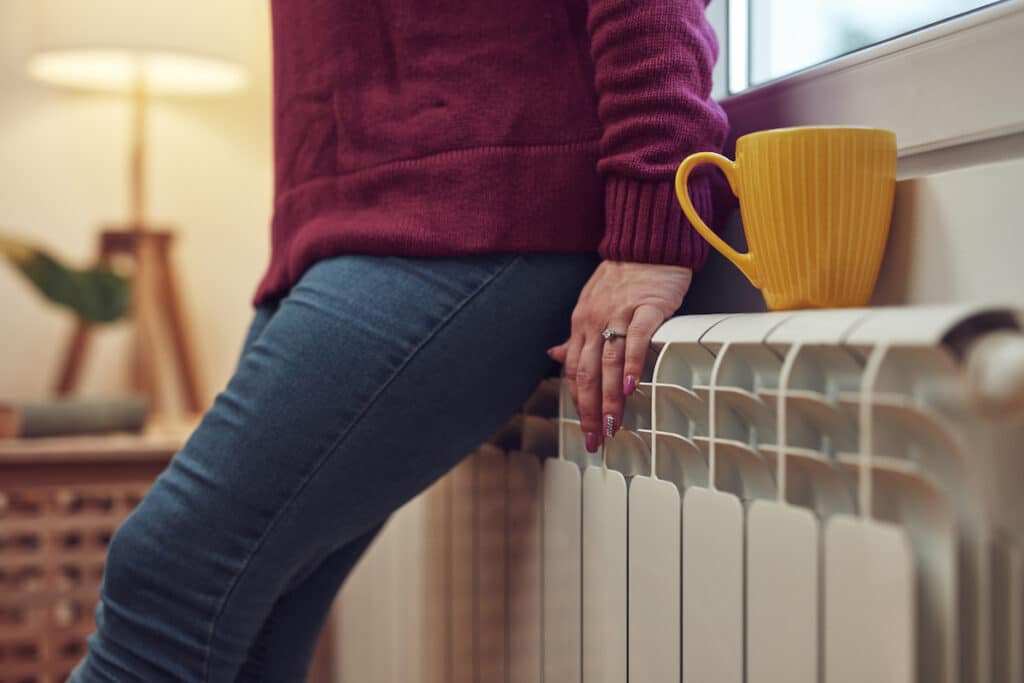
6. Reduce Heat Gain and Loss
Proper Ventilation
Balanced ventilation is essential for maintaining indoor air quality while managing energy consumption. Consider installing energy recovery ventilators (ERVs) or heat recovery ventilators (HRVs) to exchange stale indoor air for fresh outdoor air while minimizing energy loss.
Proper ventilation not only improves indoor air quality but also helps regulate humidity levels, enhancing overall comfort.
Window Treatments
Window coverings such as blinds, shades, and curtains can significantly reduce heat gain during the warmer months and prevent heat loss during the colder months. Utilize them strategically to control natural light and indoor temperatures.
Window treatments not only contribute to energy efficiency but also offer privacy, light control, and aesthetic enhancement.
7. Energy Efficiency Practices
Proper Use of Ceiling Fans
Ceiling fans can help distribute conditioned air efficiently throughout your home. In the summer, set fans to rotate counterclockwise to create a cooling breeze. In the winter, reverse the direction to circulate warm air that rises to the ceiling.
Using ceiling fans in conjunction with your HVAC system can reduce the need for constant temperature adjustments, saving energy.
Natural Ventilation
Take advantage of natural ventilation on mild days. Open windows strategically to allow fresh air to circulate, reducing reliance on your HVAC system.
Natural ventilation not only reduces energy consumption but also provides a refreshing indoor environment.
8. Embrace Technology: Smart Thermostats and Monitoring Systems
Smart Thermostats
Investing in a smart thermostat allows you to remotely control your HVAC system, adjusting temperatures based on your schedule and preferences. Some models even learn your habits over time, further optimizing energy consumption.
Smart thermostats not only increase convenience but also provide insights into your energy usage patterns.
Energy Monitoring Systems
Energy monitoring systems provide real-time insights into your home’s energy usage. These systems help you identify energy-intensive activities and adjust your behavior to minimize waste.
Energy monitoring systems promote awareness and empower you to make informed energy-saving decisions.
Enhance Your HVAC System’s Energy Efficiency
Enhancing your HVAC system’s energy efficiency isn’t just about reducing utility bills—it’s a commitment to sustainability, conservation, and creating a comfortable living environment.
By implementing these strategies in detail, you can significantly reduce energy consumption while enjoying optimal indoor comfort. From routine preventative maintenance and sealing air leaks to upgrading appliances and embracing technology, each step you take toward improving your HVAC system’s efficiency contributes to a greener future and a more cost-effective home.
With these measures, you’ll not only improve your own quality of life but also play a part in protecting the environment for future generations.
If you’re searching for an HVAC technician to help you keep your system running efficiently, reach out to Trust Heating and Air!

